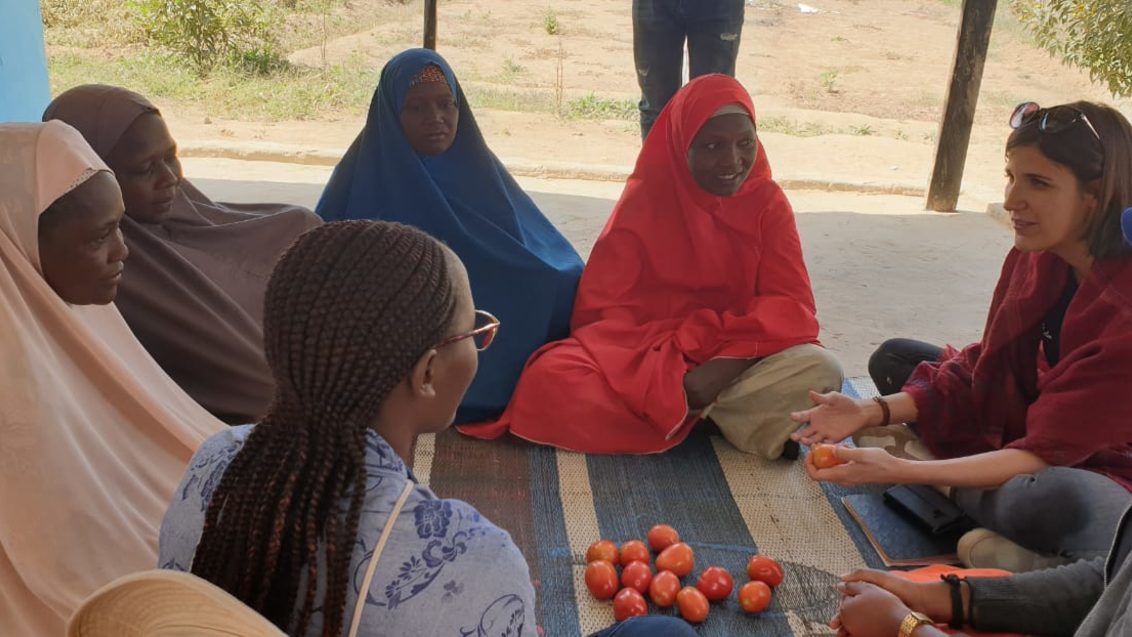Happy to farm, but slowed down by men

Gender often plays a role in business success. Our Nigerian team asked female smallholders for their views. For International Women’s Day this week, here are some insights.
In Nigeria, female smallholders engage in numerous different aspects of agriculture. These include crop production, harvesting, animal husbandry, marketing and processing. However, they still face greater challenges than their male counterparts. «Women farmers are often faced with prejudice by produce buyers. It’s also hard for them to get access to mechanization», explains Isaiah Gabriel, our Nigeria Project Coordinator. «Culturally, it can be difficult for women to trade with men, or even to spend much time outside the house and smallholding».
Rather than shrug our shoulders or just repeat common assumptions, the Foundation decided to take a closer look. As in other countries, our team in Nigeria provides opportunities for interns to get involved in our work. A perfect opportunity for Blessing Michael, an Economics graduate now doing a Monitoring & Evaluation internship! She helped develop the questionnaire and then ran the survey at one of the two chosen locations. Other team members mirrored her inquiry at a second site. «I wanted to see where women feel they stand in farming», says Blessing. The following is a brief summary of her extensive report.
The survey focused on a community in Kano State and one in Kaduna, both in Northern Nigeria. Blessing and the other interviewers collected answers from 33 women. Most are married or widowed; many completed secondary education. Farming is their main employment and by far the most important source of income.
«Relationships with the local community can be crucial for farmers’ ability to increase their income», says Blessing. «So we asked specifically about those. About half said the relationship is strong, and two of the 33 see themselves as local influencers. But that leaves some 40% whose trading success is currently probably limited by more distanced relationships.»
Interwoven with business success and social acceptance are feelings towards one’s profession. Over half of those surveyed prefer farming to any other job. «I’m also glad to say that two-thirds are happy and proud to be farmers», comments Blessing. A smaller group is at least ‘fairly happy’, and only a few are unhappy. «My personal reading is that if women feel encouraged and empowered, they do better and are happier.» The smallholders almost universally feel that they add value both to their households and the broader community.
«These findings need putting in perspective, though», Blessing adds. Numerous interviewees confirmed that being a woman limits how they can operate. «Such limitations come from traditional and religious beliefs», explains Isaiah Gabriel. «The expectation is that married women, in particular, should have no business dealings with men.» Some of the women added that male produce buyers paid them lower prices because of their gender.
Almost all interviewees said they need more support, chiefly in the areas of input supply, finance and market. Access to credit is a special challenge. «These are important signals to the Foundation as we move our work forwards», Isaiah declares. «We are emphasizing to women the need for independence and self-reliance. This includes opening up their paths to roles such as Farmers’ Hub managers. Many men have a pre-conceived notion that women shouldn’t be too ambitious. We are working hard to show them the importance of our improvements. But changing mindsets doesn’t happen overnight!»
Alongside these efforts, the Foundation is also working on a gender strategy with the Nigerian seed company participating in our Seeds for Impact program. We hope to report on this soon.
FEATURED
